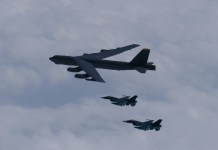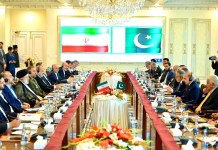The United States appears to be facing a severe roadblock in renewing a binding treaty with the Marshall Islands, which have long sought compensation for the dozens of US nuclear tests conducted there between the 1940s and 1950s.
21 HIMARS Shells, 26 Kamikaze Drones Shot Down; Russia & Ukraine Make Big Claims As War Intensifies
Killing Starlink! Russian Media Says Over 4000 Missiles Required To Destroy Starlink Service; Experts Say ‘Mission Impossible’
The provisions of a Compact of Free Association (COFA), signed between the Pacific island group and the US in 1986, will be reviewed by the Marshall Islands and the United States later this year.
The COFA’s key components include US immigration benefits for Marshallese citizens, direct economic support, and exclusive American defense and security access to the islands and their territorial waters.
The Marshall Islands leaders have repeatedly highlighted that the long-term repercussions of the 67 US nuclear tests conducted between 1946 and 1958 on health, the environment, and the economy must be adequately addressed before they consent to a new economic agreement with the US.
:quality(70)/cloudfront-us-east-1.images.arcpublishing.com/archetype/BRH4D35IYJBB7IYXJEGIXICB2Q.jpg)
Between 1946 and 1958, the Marshall Island atolls of Bikini and Enewetak witnessed the explosion of 67 nuclear weapons. The US State Department told Nikkei Asia that “the Biden-Harris Administration has prioritized the upcoming negotiations as a national policy objective.”
The US has not yet formally acknowledged and apologized for the damage that its nuclear testing program caused. Washington, however, reiterated its commitment to nuclear nonproliferation in the region in a joint statement that was issued following a summit of Pacific leaders in September.
“The United States is committed to the safe removal and disposal of unexploded ordnance, and hereby acknowledges the concerns of Pacific Island States regarding other remnants of World War II,” the statement said.
But, the Marshallese abruptly postponed discussions with the US that were slated for late September. The island group contended that there could be no advancement as long as the US refused to talk about taking accountability for its nuclear bomb tests conducted there.
The Marshall Islands, a group of 1,200 islands in the center of the Pacific Ocean, has been a vital part of American military and political influence since World War II.
The Marshall Islands are a former US territory and are one of just 14 nations that have diplomatic ties with Taiwan. Furthermore, the Kwajalein Atoll in the island group is home to Washington’s major ballistic missile testing range and an essential link in the country’s space program.
The China Factor
The Compact treaties, which cover an ocean area greater than the entire US, with the Marshall Islands, Federated States of Micronesia, and Palau, are crucial in Washington’s eyes for halting Chinese expansion in the region.
A new report titled “China’s Influence on the Freely Associated States of the Northern Pacific,” published on September 20 by the United States Institute of Peace, recently highlighted the importance of the treaty in the Indo-Pacific region.
The report noted that the security arrangements established by the Compacts of Free Association have increased US power projection in the Indo-Pacific, organized US defense strategy and force posture, and supported crucial defense capabilities.
According to the report, the significance of the buffer introduced by US strategic denial over FAS territorial seas is expected to rise as China looks to fulfill its objectives for a blue water fleet and to strengthen its security ties with Pacific countries.
However, the outcome of the upcoming negotiations with the Marshallese is far from guaranteed, given the existing circumstances. This might give Beijing the chance to thwart Washington’s goals for the Pacific.

Recently, a Chinese initiative to establish an economic zone on the atoll of Rongelap was dropped amid a flurry of inquiries and accusations, supporting concerns that Beijing was using spoiling tactics.
Iveta Cherneva, human rights and foreign policy author and analyst told Asia Nikkei that if COFA renegotiations are unsuccessful, China will undoubtedly step in to fill the void.
She continued by saying that the upcoming COFA renegotiations are the ideal opportunity to acknowledge the damage done by the US nuclear tests and demand reparations while also noting that the islands’ very survival and future are in jeopardy due to climate change.
China is also exerting pressure on the US. The Chinese Foreign Ministry has previously stated that the US should accept responsibility for addressing the environmental harm that its nuclear tests generated.
Nevertheless, the US-FAS relationship is a crucial mechanism for bolstering regional standards and democratic ideals as Washington works with regional partners to curtail the reach of Beijing’s clout in the Indo-Pacific.
- Contact the author at ashishmichel@gmail.com
- Follow EurAsian Times on Google News





